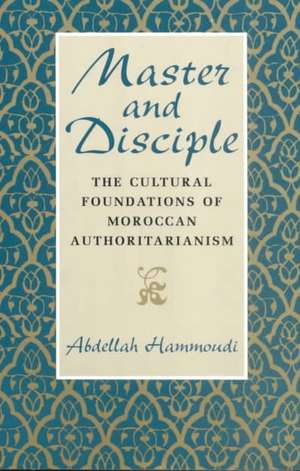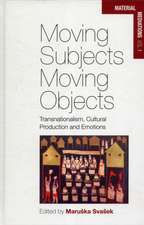Master and Disciple: The Cultural Foundations of Moroccan Authoritarianism
Autor Abdellah Hammoudien Limba Engleză Paperback – oct 1997
In the postcolonial era, Arab societies have been ruled by a variety of authoritarian regimes. Focusing on his native Morocco, Abdellah Hammoudi explores the ideological and cultural foundations of this persistent authoritarianism.
Building on the work of Foucault, Hammoudi argues that at the heart of Moroccan culture lies a paradigm of authority that juxtaposes absolute authority against absolute submission. Rooted in Islamic mysticism, this paradigm can be observed in the drama of mystic initiation, with its fundamental dialectic between Master and Disciple; in conflict with other cultural forms, and reelaborated in colonial and postcolonial circumstances, it informs all major aspects of Moroccan personal, political, and gender relations. Its influence is so pervasive and so firmly embedded that it ultimately legitimizes the authoritarian structure of power. Hammoudi contends that as long as the Master-Disciple dialectic remains the dominant paradigm of power relations, male authoritarianism will prevail as the dominant political form.
"Connecting political domination to gift exchange, ritual initiation, social loyalty, and gender reversals, Master and Disciple is nothing less than a thoroughgoing revision of our understanding of authoritarian rule in Morocco and in the Arab world in general."—Clifford Geertz, Institute for Advanced Study
Building on the work of Foucault, Hammoudi argues that at the heart of Moroccan culture lies a paradigm of authority that juxtaposes absolute authority against absolute submission. Rooted in Islamic mysticism, this paradigm can be observed in the drama of mystic initiation, with its fundamental dialectic between Master and Disciple; in conflict with other cultural forms, and reelaborated in colonial and postcolonial circumstances, it informs all major aspects of Moroccan personal, political, and gender relations. Its influence is so pervasive and so firmly embedded that it ultimately legitimizes the authoritarian structure of power. Hammoudi contends that as long as the Master-Disciple dialectic remains the dominant paradigm of power relations, male authoritarianism will prevail as the dominant political form.
"Connecting political domination to gift exchange, ritual initiation, social loyalty, and gender reversals, Master and Disciple is nothing less than a thoroughgoing revision of our understanding of authoritarian rule in Morocco and in the Arab world in general."—Clifford Geertz, Institute for Advanced Study
Preț: 248.25 lei
Nou
Puncte Express: 372
Preț estimativ în valută:
47.51€ • 49.32$ • 39.61£
47.51€ • 49.32$ • 39.61£
Carte tipărită la comandă
Livrare economică 22 martie-05 aprilie
Preluare comenzi: 021 569.72.76
Specificații
ISBN-13: 9780226315287
ISBN-10: 0226315282
Pagini: 222
Dimensiuni: 140 x 216 x 18 mm
Greutate: 0.29 kg
Ediția:1
Editura: University of Chicago Press
Colecția University of Chicago Press
ISBN-10: 0226315282
Pagini: 222
Dimensiuni: 140 x 216 x 18 mm
Greutate: 0.29 kg
Ediția:1
Editura: University of Chicago Press
Colecția University of Chicago Press
Cuprins
Preface
Acknowledgments
Introduction
1: Foundations of Monarchical Authority and Forms of Exercise of Power: Toward a Redefinition of the Moroccan Political System
2: Dar-al-Mulk as Discourse and Practice of Power: The Cultural Schemata of Domination and Submission before the Colonial Conquest
3: Master and Disciple: Identifying a Historical Diagram and the Sources of Its Sanctification
4: The Colonial Elaboration of Authoritarianism
5: The Cultural Schema, Its Salience, and the Structural Tension It Mediates
6: On the Comparative Potential of the Paradigm
Notes
Index
Acknowledgments
Introduction
1: Foundations of Monarchical Authority and Forms of Exercise of Power: Toward a Redefinition of the Moroccan Political System
2: Dar-al-Mulk as Discourse and Practice of Power: The Cultural Schemata of Domination and Submission before the Colonial Conquest
3: Master and Disciple: Identifying a Historical Diagram and the Sources of Its Sanctification
4: The Colonial Elaboration of Authoritarianism
5: The Cultural Schema, Its Salience, and the Structural Tension It Mediates
6: On the Comparative Potential of the Paradigm
Notes
Index












